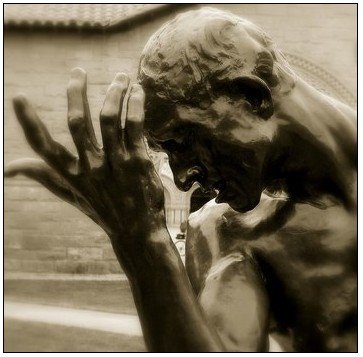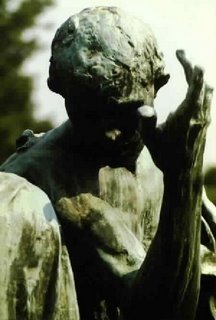

 The character Pierre, from Rodin's evocative Burghers of Calais ensemble sculpture, which I was considering using for the latest Free Radical cover until we discovered the perfectly suited image you now see.
The character Pierre, from Rodin's evocative Burghers of Calais ensemble sculpture, which I was considering using for the latest Free Radical cover until we discovered the perfectly suited image you now see.But Pierre de Wiessant is a great figure in his own right, one of Rodin's finest in my view, and part of a piece of intense nobility, and powerful human drama -- and doesn't that hand just say so much?
The Burghers of Calais (Les Bourgeois de Calais) is one of the most famous sculptures by Auguste Rodin, completed in 1888. It serves as a monument to an occurrence in 1347 during the Hundred Years' War, when Calais, an important French port on the English Channel, was under siege by the English for over a year.NB: MOMA has a great booklet discussing the Burghers. Definitely worth a read.
The story goes that England's Edward III, after a victory in the Battle of Crécy, laid siege to Calais and Philip VI of France ordered the city to hold out at all costs. Philip failed to lift the siege and starvation eventually forced the city to parlay for surrender. Edward offered to spare the people of the city if any six of its top leaders would surrender themselves to him, presumably to be executed. Edward demanded that they walk out almost naked and wearing nooses around their necks and be carrying the keys to the city and castle...
RELATED POSTS ON: Art, Sculpture
2 comments:
Beautiful!
Many years ago, as a teenager I visited the Melbourne art centre (or museum, I forget which) and came unexpectedly on Rodin's 'Balzac.'
It was like being hit with a cattle prod-- nobody had told me anything like this existed!
For the next couple of hours I just looked. Went away and came back and looked again.
Hard to beat as a first encounter with great art and nothing since has equalled it.
I know it. Up until a couple of years ago, I hadn't been a fan of the 'Balzac,' having only seen it in pictures, or in crowded rooms.
And then a couple of years ago I was in Melbourne for a week, and I discovered it in that sculpture courtyard. Wow! What power! It seemed to 'hold' the whole city! And in 'real life,' like all of Rodin's work, I swear that it actually seems to move.
I came back and visited it every day. :-)
PS: I felt the sme when I stumbled upon the Burghers at Westninster, just down from the Houses of Parliament. Like you say, it was like being hit with a cattle prod.
Except better. :-)
PPS: You've descibed one reason I perist wit these art posts. Mostly because, I confess, I really enjoy them, but partyly too so that others can have that same experience you describe from all the great art out there that is buried tehse days beneath the McCahons and the Hoteres and the likes of the Turner Prize winners.
I want people to say just as you've said, "It was like being hit with a cattle prod-- nobody had told me anything like this existed!
Post a Comment